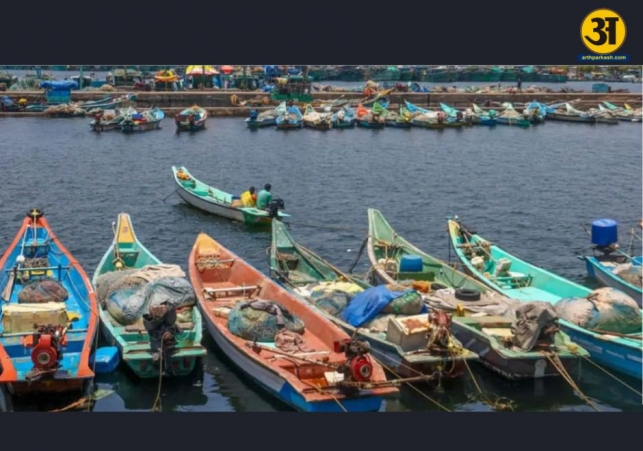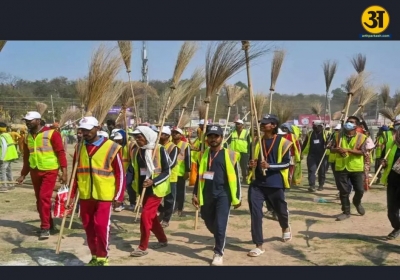
TN fishermen on strike after Sri Lanka arrests 32
Tamil Nadu fishing community begins indefinite strike over arrest of 32 fishermen by Sri Lanka
Fishermen in Tamil Nadu have started an indefinite strike after 32 of their fellow workers were arrested by the Sri Lankan Navy. The fishermen, refusing to operate their 700 mechanized deep-sea trawlers, began their protest on Monday at the Rameswaram fish landing center, the largest in Tamil Nadu. This strike is causing a daily loss of ₹1 crore and affecting over 10,000 families.
The Sri Lankan Navy arrested these fishermen on Sunday and seized their boats. This has led to widespread protests across Tamil Nadu, with fishing organizations demanding the immediate release of those arrested.
Tamil Nadu Chief Minister MK Stalin has spoken to External Affairs Minister S. Jaishankar, urging him to hold a meeting between India and Sri Lanka to find a permanent solution. Since January, 119 Indian fishermen and 16 boats have been captured by Sri Lanka in different incidents.
Fishermen demand justice
Many political leaders have expressed their concerns. PMK leader Anbumani Ramadoss said these repeated arrests are a serious issue for India's sovereignty. He also pointed out that the India-Sri Lanka Joint Working Group on Fisheries had agreed last year to treat this as a humanitarian and livelihood problem.
During the early hours of Sunday, the Sri Lankan Navy arrested the fishermen from Rameswaram and nearby areas. They also seized five trawlers, claiming the fishermen were poaching in Sri Lankan waters.
ALSO READ: Jamaican envoy praises S Jaishankar as one of the most efficient foreign ministers
ALSO READ: Indian student wins memory championship by recalling 80 digits in 13.50 seconds
On Sunday and Monday, protests were held across Tamil Nadu. Fishermen's organizations say they will continue striking until the Indian government finds a lasting solution.
P. Jesuraja, the president of the All India Mechanised Boats Fishermen Association, owns one of the seized trawlers. He is worried because, last year alone, Sri Lanka arrested 530 Indian fishermen and seized 381 boats.
In December, Sri Lankan President Anura Kumara Dissanayake and Indian Prime Minister Narendra Modi met in Delhi. They agreed that the issue of Tamil Nadu fishermen in the Palk Straits should be handled with a humanitarian approach.
DMK leader Kanimozhi Karunanidhi has assured the fishing communities in Ramanathapuram, Pudukottai, Nagapattinam, Thirunelveli, and Kanyakumari districts that her party stands with them. These fishermen are struggling to make a living while facing constant threats from the Sri Lankan Navy.
R. Sagayam, a fishermen’s leader, said strategies will be planned in the next two days to force the Indian government to take action. Fishermen are also worried that Sri Lanka may auction off 67 Indian fishing boats seized this year.
Sagayam said, “Sri Lanka selling our boats is unfair. Our government should ensure our fishing rights in the Palk Straits are protected. At the very least, India should arrange a meeting between our fishermen and Sri Lankan fishermen to solve their objections.”
Last Sunday, DMK fishermen organized a massive protest in Ramanathapuram against the Indian government’s failure to stop these arrests. Kanimozhi, who led the protest, said the Indian government should arrange direct talks between Indian and Sri Lankan fishermen to find a solution.
Fishermen argue that they only fish in traditional waters, but they sometimes enter international waters because the fish population is better there. They say once Sri Lanka seizes their boats, they never get them back, which destroys their livelihood.
N.J. Bose, a fishermen’s leader from Rameswaram, explained that Tamil Nadu’s fishing area has been reduced from 52 nautical miles to just 12 after the 1974 Katchatheevu agreement between India and Sri Lanka.
“Years ago, we used small country boats, but the government encouraged us to switch to mechanized trawlers. Now Sri Lanka opposes these trawlers, and we are left with no options. The only way to solve this is through diplomatic talks,” Bose said.
K. Navas Kani, a Lok Sabha MP from Ramanathapuram, said that the Indian government’s lack of response has led to the arrest of over 3,500 fishermen and the seizure of hundreds of boats over the last decade.
Kanimozhi also pointed out that similar fishing disputes have been resolved in other countries, like Norway and Russia or Australia and Indonesia. She questioned why India has not taken similar steps with Sri Lanka.
Bose added, “Indian fishermen are often forced to retreat at gunpoint, even from permitted fishing areas near Katchatheevu.”
A.P. Lipton, a retired scientist from the Central Marine Fisheries Research Institute, said, “The first thing India must do is demand the immediate release of our fishermen. Second, our fishermen must also avoid using banned trawlers in Sri Lankan waters.”
Fishermen in Tamil Nadu say they will not stop their protests until a proper agreement is reached between both countries, ensuring their safety and fishing rights.





